

Aanya Raichura
What are Equity Shares? What are Equities?
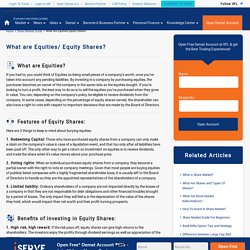
If you had to, you could think of Equities as being small pieces of a company’s worth, once you’ve taken into account any pending liabilities. By investing in a company by purchasing equities, the purchaser becomes an owner of the company in the same ratio as the equities bought. If you’re looking to turn a profit, the best way to do so is to sell the equities you’ve purchased when they grow in value. You can, depending on the company’s policy, be eligible to receive dividends from the company. In some cases, depending on the percentage of equity shares owned, the shareholder can also have a right to vote with respect to important decisions that are made by the Board of Directors. Features of Equity Shares: Here are 3 things to keep in mind about burying equities.
What are the Documents Required for KYC? What is the Meaning of Demat Account? A Demat account is primarily used to electronically hold securities and shares.

The concept was first introduced in the country in the year 1996 as an alternative to physical share certificates. A Demat account not only makes share trading quick and easy, but also eliminates all of the risks and problems associated with physical share certificates. You can use a Demat account to store a wide variety of investments such as equity shares, ETFs, bonds, debt securities, mutual funds, and government securities among others. How to Open Trading Account Online? India has been moving towards a cashless economy.
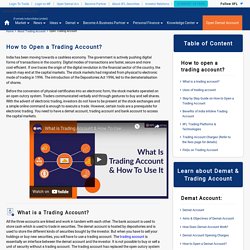
The government is actively pushing digital forms of transactions in the country. Digital modes of transactions are faster, secure and more cost-efficient. What is e-KYC: Meaning and Process. KYC is the abbreviation of Know Your Customer.
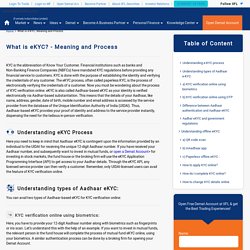
Financial institutions such as banks and Non-Banking Finance Companies (NBFCs) have mandated KYC regulations before providing any financial service to customers. KYC is done with the purpose of establishing the identity and verifying the credentials of any customer. The eKYC process, often called paperless KYC, is the process of electronically verifying the credentials of a customer. Now you must be wondering about the process of KYC verification online. eKYC is also called Aadhaar-based eKYC as your identity is verified electronically via Aadhar-based substantiation. This means that the details of your Aadhaar, like name, address, gender, date of birth, mobile number and email address is accessed by the service provider from the database of the Unique Identification Authority of India (UIDAI).
Understanding eKYC Process. Sub-broker Eligibility Criteria and Qualification. How To Become A Sub-broker? In India, the stock market has lately been experiencing a meteoric rise in popularity.
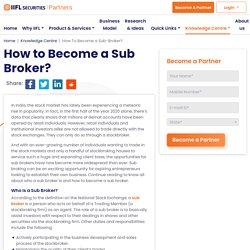
In fact, in the first half of the year 2020 alone, there’s data that clearly shows that millions of demat accounts have been opened by retail individuals. However, retail individuals and institutional investors alike are not allowed to trade directly with the stock exchanges. They can only do so through a stockbroker. And with an ever-growing number of individuals wanting to trade in the stock markets and only a handful of stockbroking houses to service such a huge and expanding client base, the opportunities for sub brokers have now become more widespread than ever.
Sub broking can be an exciting opportunity for aspiring entrepreneurs looking to establish their own business. Different Types Of Demat Account in India. Indians have access to a number of financial and physical investment products.
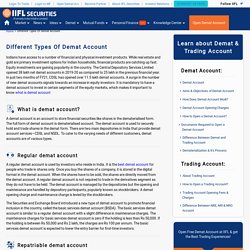
While real estate and gold are primary investment options for Indian households, financial products are catching up fast. Equity investments are gaining popularity in the country. The Central Depository Services Limited opened 38 lakh net demat accounts in 2019-20 as compared to 25 lakh in the previous financial year. In just two months of FY21, CDSL has opened over 11.5 lakh demat accounts. The Basic Concepts of Trading and Demat Accounts - India Infoline. How does a Demat Account work. Overview Demat or dematerialised accounts were first introduced in India in 1996 by the National Stock Exchange (NSE).
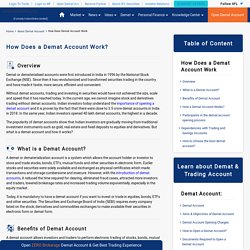
Since then it has revolutionized and transformed securities trading in the country and have made it faster, more secure, efficient and convenient. Without demat accounts, trading and investing in securities would have not achieved the size, scale and speed that it has reached today. Demat vs Trading Account. If you want to invest in stock markets, there are a plethora of factors that you should be aware of.
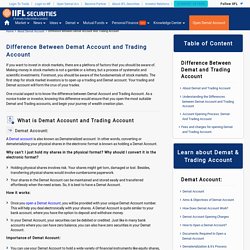
Trading Account Opening Fees, Charges - India Infoline. What is NSDL (National Securities Depository Limited) - Benefits & Services. The National Securities Depository Limited is a financial entity set up to hold securities in the form of tangible or non-physical certificates.
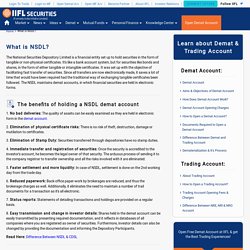
It's like a bank account system, but for securities like bonds and shares, in the form of either tangible or intangible certificates. It was set up with the objective of facilitating fast transfer of securities. Since all transfers are now electronically made, it saves a lot of time that would have been required had the traditional way of exchanging tangible certificates been followed.
Who Can Open A Demat Account In India - India Infoline. In some respects, a Demat account is like a bank account.

You have equity shares and other securities in your Demat account just as you keep your cash balances in your bank account. Shares were historically held in physical (share certificates) form (before 1997). Once these physical shares are dematerialized, they can be held in a Demat account. No concerns about slow delivery, loss of share certificates, bad signatures, etc. Nowadays, both share purchases and sales are done in Demat-mode only.